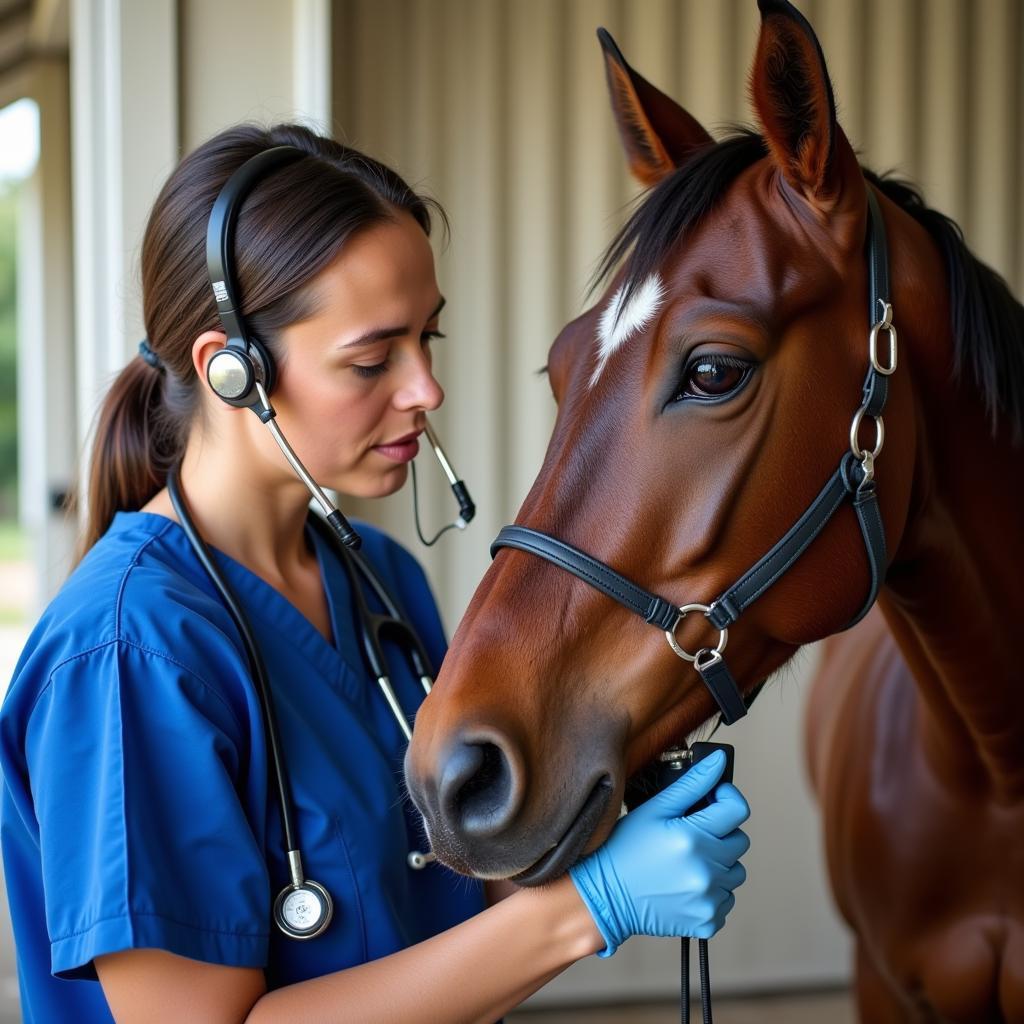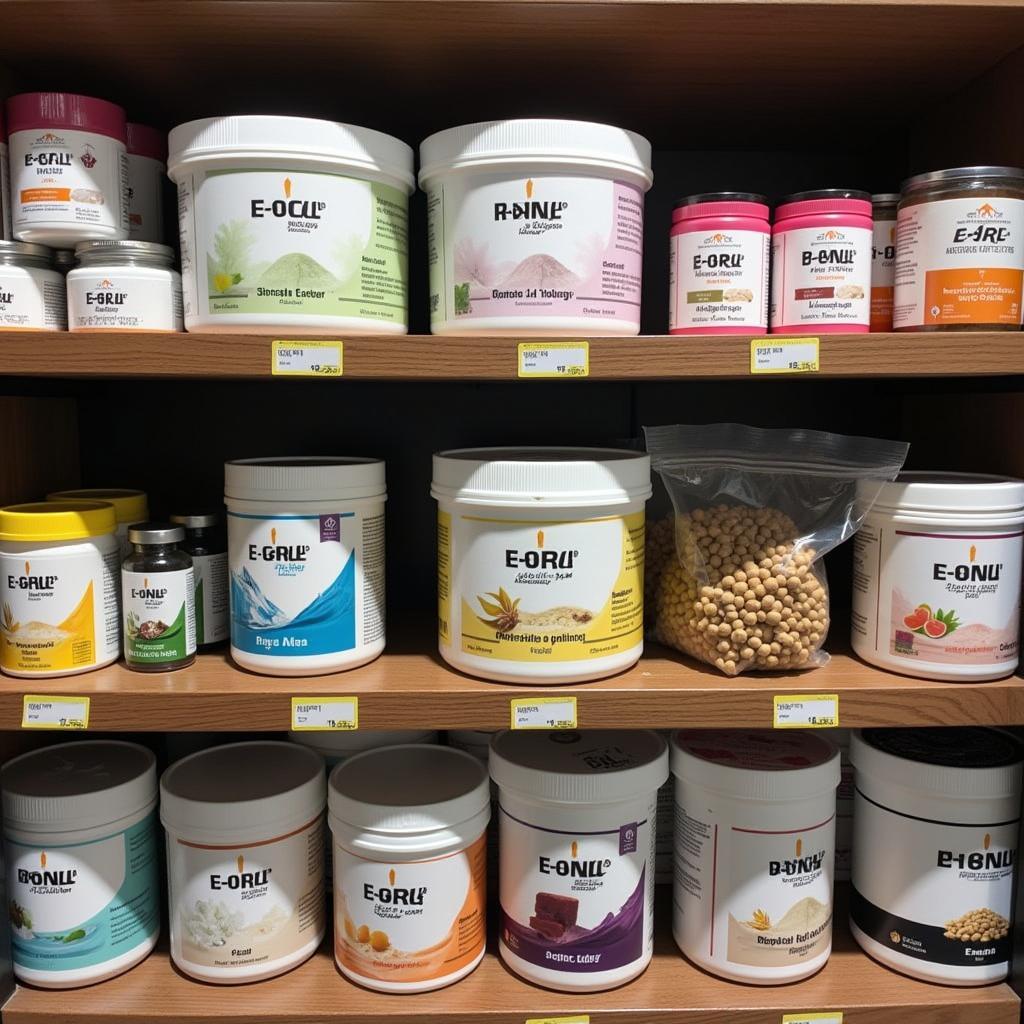E-se, short for vitamin E and selenium, is a crucial supplement that plays a vital role in maintaining the overall health and well-being of horses. While often grouped together, vitamin E and selenium function independently within the equine body, working synergistically to support various physiological processes.
Understanding the importance of e-se, recognizing signs of deficiency, and implementing appropriate supplementation strategies are essential for horse owners to ensure their equine companions thrive. This comprehensive guide delves into the multifaceted aspects of E-se For Horses, providing valuable insights into its benefits, usage, and potential considerations.
The Dynamic Duo: Vitamin E and Selenium for Horses
Vitamin E, a potent antioxidant, safeguards cells against damage caused by free radicals, unstable molecules generated during normal metabolic processes. In horses, vitamin E protects muscle cells, particularly those involved in locomotion, from oxidative stress, which can lead to muscle weakness, fatigue, and impaired performance.
Selenium, a trace mineral, is a critical component of enzymes involved in various metabolic functions, including antioxidant defense, thyroid hormone metabolism, and immune system regulation. Adequate selenium levels are crucial for maintaining muscle function, reproductive health, and a robust immune response.
Why is E-se Important for Horses?
E-se supplementation offers a range of benefits for horses of all ages, breeds, and disciplines, contributing to their overall health and vitality:
- Muscle Health and Performance: E-se supports muscle function and recovery, enhancing athletic performance and reducing the risk of muscle disorders, such as equine motor neuron disease (EMND) and myopathy.
- Immune System Support: Selenium plays a vital role in maintaining a healthy immune system, enabling horses to effectively combat infections and diseases.
- Reproductive Health: Adequate selenium levels are essential for optimal reproductive function in both mares and stallions, contributing to successful breeding and healthy offspring.
- Antioxidant Protection: Vitamin E, as a powerful antioxidant, protects cells from oxidative damage, reducing the risk of chronic diseases and supporting overall well-being.
Recognizing E-se Deficiency in Horses
Identifying e-se deficiency in its early stages is crucial to prevent potential health issues. While clinical signs may vary, common symptoms include:
- Muscle Weakness and Fatigue: Horses may exhibit reluctance to move, difficulty backing up, or a shortened stride.
- Muscle Soreness and Stiffness: Horses may show signs of discomfort, such as flinching when touched or difficulty bending.
- Impaired Immune Function: Deficiencies can weaken the immune system, making horses more susceptible to infections.
- Reproductive Issues: Mares may experience difficulty conceiving or carrying a foal to term.
 Veterinarian examining a horse for potential e-se deficiency
Veterinarian examining a horse for potential e-se deficiency
E-se Supplementation: Finding the Right Balance
The e-se requirements of horses can vary based on several factors, including age, breed, activity level, and the selenium content of their diet. Forage and soil selenium levels can significantly influence the need for supplementation.
It is crucial to consult with a veterinarian to determine the appropriate dosage and type of e-se supplement for your horse. Over-supplementation can be toxic, highlighting the importance of professional guidance.
Different Forms of E-se Supplements
E-se supplements are available in various forms, including:
- Oral Supplements: Powdered or pelleted supplements can be added to the horse’s regular feed for convenient administration.
- Injectables: Injectable e-se provides a direct and rapid way to address deficiencies, particularly in severe cases.
- Enhanced Feeds: Some commercially available horse feeds are fortified with vitamin E and selenium, providing a balanced dietary source.
Choosing the Right E-se Supplement for Your Horse
When selecting an e-se supplement, consider the following factors:
- Form: Choose a form that aligns with your horse’s preferences and your management practices.
- Dosage: Follow your veterinarian’s recommendations for appropriate dosage based on your horse’s individual needs.
- Quality: Opt for reputable brands known for producing high-quality supplements with accurate labeling and ingredient sourcing.
 Various forms of e-se supplements for horses, including oral powders, pellets, and injectables
Various forms of e-se supplements for horses, including oral powders, pellets, and injectables
Conclusion: Prioritizing E-se for Optimal Equine Health
E-se supplementation is a fundamental aspect of responsible horse ownership, playing a crucial role in maintaining muscle health, immune function, reproductive success, and overall well-being. By understanding the significance of e-se, recognizing potential deficiency signs, and implementing appropriate supplementation strategies in consultation with a veterinarian, horse owners can ensure their equine companions thrive. Prioritizing e-se empowers horse owners to make informed decisions that contribute to the long-term health and happiness of their cherished animals.
For personalized guidance on e-se supplementation for your horse, contact Justus Horses USA at 0772127271 or [email protected]. Our team of equine experts is dedicated to providing exceptional care and support for all your horse’s needs.